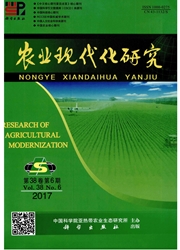

 中文摘要:
中文摘要:
近年来随着农村劳动力的转移就业,我国农业劳动力数量不断下降,老龄化和女性化趋势明显。农业机械化是应对农村人口变化的关键,在此背景下研究了农机社会化服务对农户农业劳动力变化的补充以及相关的制约因素。基于江苏和安徽省调查数据,利用Probit模型实证分析了农业劳动力特征以及耕地细碎化对农机社会化服务采用的影响。结果表明,在耕地环节和收割环节分别有70.54%和66.83%的农户会全部采用农机社会化服务。老龄户和女性户由于体力、技术等原因会更加偏向于采用农机社会化服务;耕地细碎化则阻碍了农机服务的采用。因此,为进一步促进我国农业机械化发展,提出政府应该不断完善农机社会化服务体系建设,在有条件的地区对土地进行规整降低细碎化程度的政策建议。
 英文摘要:
英文摘要:
With a large number of rural labors seeking employment opportunities in non-farm sectors, China has experienced signiifcant decline, aging and feminization of its agricultural labor force. One solution to these problems is to develop agricultural mechanization. The paper studies the complement of machinery services for the demographic change of rural households and its constraints. Based on the survey data from Jiangsu and Anhui Province, and applying a Probit model, this paper estimates the effect of agricultural labor characteristics and land fragmentation on the adoption of agricultural machinery socialized service. Results show that for ploughing and harvest, 70.54% and 66.83% households fully rely on the purchased machinery service. Due to lack of physical strength and skills, elderly and women in rural area prefer to purchase agricultural machinery services. Meanwhile land fragmentation in rural area is a big hurdle to the adoption of agricultural machinery. Finally, this paper suggests that to promote the development of agricultural mechanization, the government should promote the development of agricultural machinery services market and encourage the consolidation of arable land.
 同期刊论文项目
同期刊论文项目
 同项目期刊论文
同项目期刊论文
 期刊信息
期刊信息
